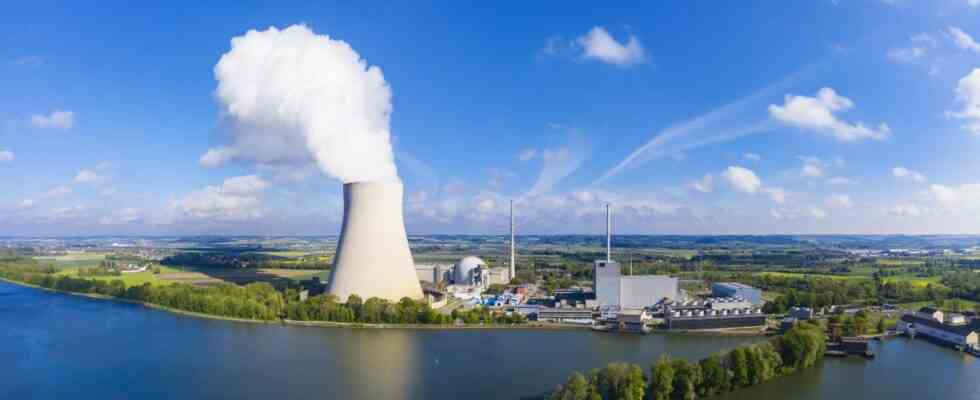TÜV Süd has categorically rejected the fact that it had provided the state government with a contract report for extending the service life of the Isar 2 nuclear power plant and restarting the plant in Gundremmingen, Swabia, which was shut down at the turn of the year. “We strictly oppose allegations that the neutrality of our position and the quality of our work are directed against it,” it said in a statement on Monday. The Ministry of the Environment, which oversees the nuclear power plants in Bavaria, also disapproved of the allegations. “TÜV Süd is one of the most renowned and most familiar experts on nuclear power issues, and it is also very familiar with the Bavarian nuclear power plants,” said a spokesman. “Only for this reason we gave the order for the report to him.” It is not clear “where the greater expertise of a Hamburg law firm in nuclear technology derives from”. The federal government, on the other hand, reiterated that it had serious doubts about the report.
The Hamburg law firm of former Greenpeace top official Michael Günther had previously criticized the TÜV paper, which dates from April 2022. It is a “sloppily argued commissioned work” and “cannot be recognized as a serious assessment,” says the statement for the environmental organization. The impression also arises that the TÜV ignores the applicable nuclear law. The rating was “apparently intended for use as a weapon in the current discussion about extending the term in the political arena.” The apparently short processing time of the TÜV also fuels the suspicion “that a courtesy report has been created here,” write the lawyers.
The connection between the state government and TÜV is close
At the weekend, Prime Minister Markus Söder and CSU Secretary General Martin Huber, who are in favor of extending the lifetime of the Isar 2 nuclear power plant to 2024, sharply rejected the Greenpeace paper. “A lawyer from Hamburg paid by Greenpeace wants to know better than TÜV,” said Söder. “There is no need to comment further.” CSU General Secretary Huber tweeted: “Greenpeace commissions Greenpeace – really brilliant and of course totally independent and serious.”
TÜV Süd and nuclear power in Bavaria are closely intertwined. For the construction of the first reactors in Bavaria, the research reactor in Munich-Garching in 1958 and the experimental nuclear power plant in Kahl am Main in Lower Franconia in 1960, the state government had consulted the then TÜV as an expert. The cooperation has evidently proved so successful that since then the Free State has concluded a large number of contracts with TÜV-Süd, including open-ended framework agreements, for the supervision of the construction and operation of the nuclear power plants in Bavaria. This is how it can be read in a response from the state government to a question from the then opposition MP and current Environment Minister Thorsten Faithr (free voters) in 2016.
The great competence of TÜV Süd, which employed up to 300 nuclear specialists at peak times, was not only in demand in Bavaria, but also in other federal states, for example in Hesse. The Free State spent a lot of money on the expertise. In the years 1990 to 2016 alone, he transferred 675 million euros to the organization for expert and monitoring activities in the four Bavarian nuclear power plants and in the Garching research reactor.
Believers for a longer term
There have always been doubts and criticism of the independence of TÜV Süd in the past. In its current report for the state government, the organization comes to the conclusion that the continued operation of the Isar 2 nuclear power plant and even a restart of the reactor in Gundremmingen are possible from a technical and safety point of view. On the basis of this report, the Free State of Bavaria launched its Federal Council initiative to extend the service life. The federal government still has massive doubts about the report. “These three pages do not meet the standards of expert work,” said a spokesman for the Federal Environment Ministry on Monday. “This is not a reliable basis from our point of view.” Colleagues in Bavaria were pointed out weeks ago that we “do not see the view there in accordance with the case law of the highest court and the previous standards of nuclear power plant safety in Germany”.
Environment Minister Faithr, on the other hand, who has long been a nuclear power critic, has adopted Söder’s view. “In the current crisis, we have to keep all opportunities to generate electricity open,” he said. “Taking responsibility means using the residual energy in the nuclear power plants for citizens and the economy.” The impending emergency in the gas and thus also the electricity supply makes it necessary to extend the running times by a few years. “Basically, the safety of people and the environment has top priority in the operation of Bavarian nuclear power plants,” says Glauber. “There is no security discount until the last day.”

